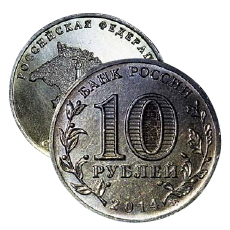 |
Russian ruble coins (Bloomberg) |
MOSCOW (AFP) ― Energy-rich Russia’s currency extended Friday its slide into record low territory and the government lowered its crucial oil price forecast in the wake of OPEC’s decision to leave its output target unchanged.
The ruble shed another 1.6 percent against the dollar and stood near the 49.35 mark in evening trading on the Moscow Exchange. It gave up the same percentage point and was valued at almost 61.55 against the euro ― also a historic low.
The beleaguered currency has been trying to find its footing ever since the OPEC cartel decided on Thursday evening not to cut back production to support oil prices that have fallen by a third since June.
The value of energy on international markets is critical here because Russia ― eager to limit borrowings at a time of extreme tensions with the West ― will generate a whopping 52 percent of its 2014 revenues from oil and gas sales.
But the global energy glut and corresponding price collapse has contributed to a ruble slide that began during the first turmoil in Ukraine this winter and accelerated in recent weeks.
The currency has now lost about a third of its value since the start of the year ― the same as during the 2008-2009 global financial crisis.
Such falls are especially sensitive to Russians who saw their ruble savings wiped out with the collapse of communism in the 1990s.
The Kremlin’s approval rating in that era once dipped below 5 percent.
But Vladimir Putin has proven to be a teflon president whose increasingly militant talk and overtly anti-American sentiments appeal to Russian nationalists and help keep his own support level near 80 percent.
The veteran Russian leader was dismissive on Friday of the turmoil hitting the world’s commodity markets and Moscow’s own trading floor.
“We do not see anything extraordinary here. The winter is coming and I am sure that the market will level off in the first quarter and the middle of the year,” he said in televised remarks.
Russia’s central bank ― its regular support for the ruble permanently suspended at the start of the month ― also vowed to jump in should things get out of hand.
“In case we identify risks of destabilization, the Bank of Russia will be ready to conduct currency interventions,” the central bank said in a statement carried by the RIA Novosti state news agency.
Yet Russia’s growth is still likely to flatline this year and contract in 2015 ― a malaise attributed to Putin’s failure to improve market conditions and develop industries that could ease the budget’s dependence on oil.
The 2014 state spending plan is based on an average oil price of $93 a barrel.
But Economy Minister Alexei Ulyukayev admitted on Friday that the 2015 draft will have to be revised to account for a Brent crude price that stood at $73.20 on Friday evening.
“There is a strong probability that it will be closer to $80 a barrel,” Ulyukayev told reporters.
“This situation once against confirms our position that Russia’s budget policies must be adapted to new oil prices,” Maxim Oreshkin of the finance ministry’s strategic planning department added.
Russia’s most powerful oil executives were also entering the winter holiday season in a sour mood.
The head of state crude giant Rosneft cautioned that prices may even approach levels not seen since early 2009.
“We think the price could fall to $60 and below, but in the course of the first half of the year,” Igor Sechin told Austria’s Die Presse daily.
Lukoil private oil firm vice president Leonid Fedun said the joint effect of falling prices and Western sanctions will probably see Russia’s oil production drop from its current peak of about 525 million tons to 490 million tons within five years.
“This decrease will not be dramatic ― it will be more similar to what is happening in the North Sea,” he told the Financial Times.








![[Today’s K-pop] Blackpink’s Jennie, Lisa invited to Coachella as solo acts](http://res.heraldm.com/phpwas/restmb_idxmake.php?idx=644&simg=/content/image/2024/11/21/20241121050099_0.jpg)